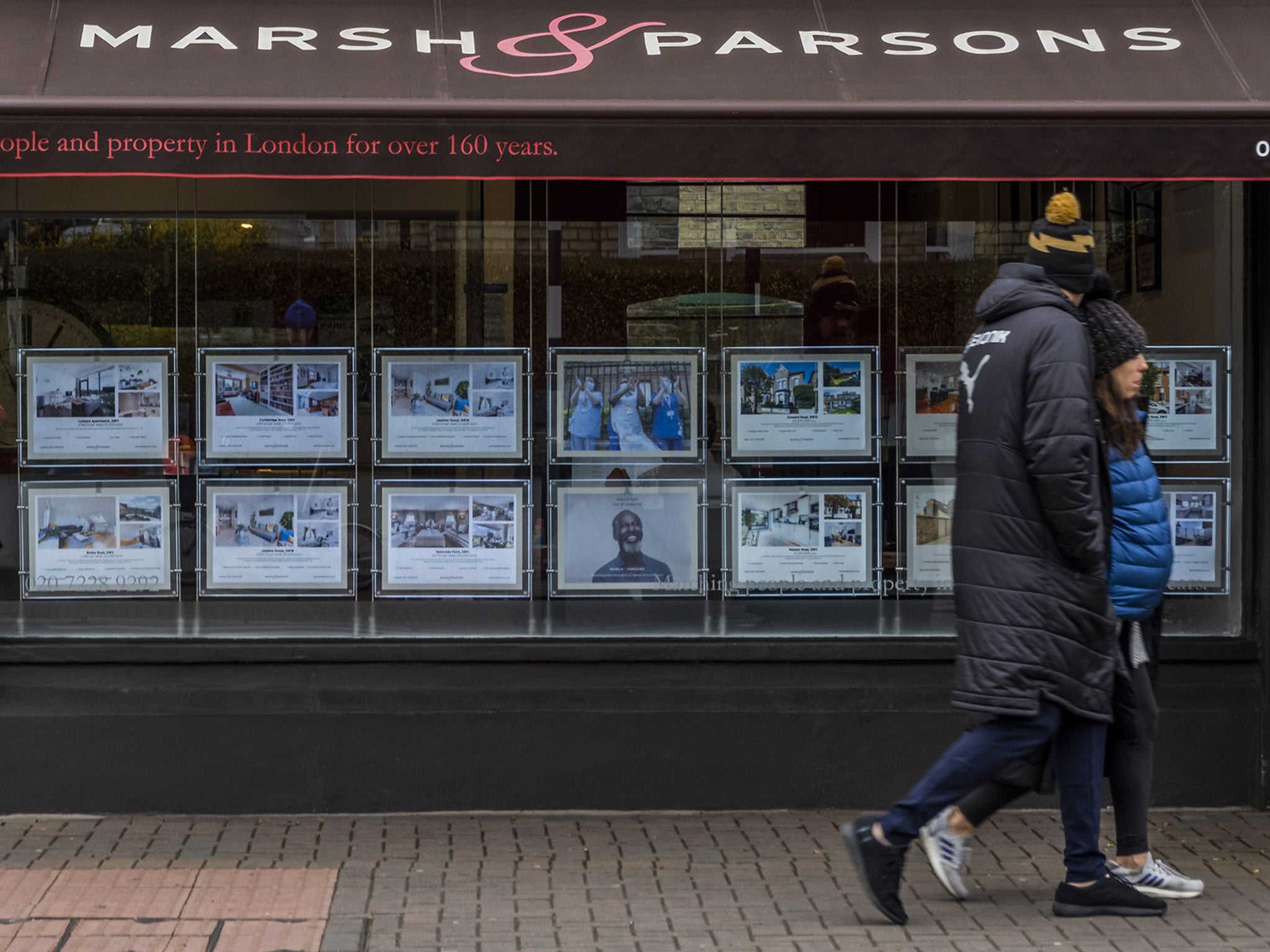UK house prices fall in January as property market runs out of steam
Average sold price dipped 0.3 per cent while estate agents say activity has slowed 'markedly'

Your support helps us to tell the story
From reproductive rights to climate change to Big Tech, The Independent is on the ground when the story is developing. Whether it's investigating the financials of Elon Musk's pro-Trump PAC or producing our latest documentary, 'The A Word', which shines a light on the American women fighting for reproductive rights, we know how important it is to parse out the facts from the messaging.
At such a critical moment in US history, we need reporters on the ground. Your donation allows us to keep sending journalists to speak to both sides of the story.
The Independent is trusted by Americans across the entire political spectrum. And unlike many other quality news outlets, we choose not to lock Americans out of our reporting and analysis with paywalls. We believe quality journalism should be available to everyone, paid for by those who can afford it.
Your support makes all the difference.The average house price slipped by 0.3 per cent in January, in signs that an uplift in the market could be running out of steam, according to an index.
It marked the biggest monthly fall since April 2020, although typical house prices are still £13,000 higher than a year ago, Halifax said.
Across the UK, average property values stood at £251,968 in January.
This was a 5.4 per cent annual increase, compared with January 2020. This also compared with 6.0 per cent annual price growth recorded in December.
Halifax managing director Russell Galley said: “The average UK house price slipped by 0.3 per cent in January, the biggest monthly fall since April last year.
“Whilst this pushed the typical property value down to its lowest level since October, at just under £252,000, prices are around £13,000 higher than a year ago.
“There are some early signs that the upturn in the housing market could be running out of steam, with the annual rate of house price inflation cooling to its lowest level since August.”
A stamp duty holiday, introduced last July, is due to end on 31 March, and this has prompted concerns that sales could reach a cliff edge.
Figures from Rightmove on Friday also showed that the proportion of house sales falling through has edged upwards in recent months, although its figures also suggest that demand for properties remains strong.
Mr Galley said industry figures for agreed sales remain well above pre-coronavirus pandemic levels.
But he said new instructions to sell have “decreased noticeably”.
Mr Galley added: “The stamp duty holiday has undoubtedly helped to fuel growing demand amongst households for larger properties.
“However, given the current time to completion across the market, transactions in the early part of 2021 probably don't include many borrowers who expect to benefit from the stamp duty reprieve.
“How far and how deep any slowdown proves to be is a challenge to predict given the prevailing uncertainty created by the pandemic. With swathes of the economy still shuttered, and joblessness continuing to edge higher, on the surface this points to slower market activity and downward price pressures in the near-term.
“That said, we saw the power of home owners to drive the market in the second half of last year as many people looked to find new properties with greater space, spurred on by increased time spent at home.
“Such structural demand changes, coupled with any further policy interventions by government, could yet sustain underlying market activity for some time to come."
Anna Clare Harper, chief executive of asset manager, SPI Capital, said: “The slowdown we are now seeing in house price growth reflects the looming end to [the stamp duty holiday].
“Looking to the future, when assuming the temporary stamp duty reduction ends, we're likely to see a slowdown in house price rises. Challenging economic conditions make potential home buyers less willing and able to buy.”
Jeremy Leaf, a north London estate agent and a former residential chairman of the Royal Institution of Chartered Surveyors (Rics), said: “As the backlog of transactions, mortgages and surveys reduce the chances of meeting the stamp duty deadline, so the market began to lose its head of steam in January.”
Howard Archer, chief economic adviser at EY ITEM Club, said: “It does look that the housing market may now be coming off the boil.”
He added: “The EY ITEM Club suspects that house prices fall by around 5 per cent over 2021.”
Mark Harris, chief executive of mortgage broker SPF Private Clients, said: “It is highly unlikely that buyers will be agreeing deals now in the hope of completing by the end of next month although those who are extremely motivated, not involved in a chain and don't have complex finance requirements may stand a remote chance with the right advice.”
Mike Scott, chief analyst at estate agency Yopa, said: “We do expect a further slowdown over the next few months as the current rush to beat the stamp duty deadline winds down, but this should be followed by a quick recovery in the second half of the year.”
Tom Bill, head of UK residential research at Knight Frank, said: “The initial wave of pent-up demand that began in May 2020 is now clearing through the system, accelerated by the end of the stamp duty holiday.
“The sensible option would be to taper the holiday and avoid any cliff-edge moments for the housing market or wider economy, particularly given how important the mobility of labour will be in coming months.
“We expect prices to end the year flat as demand becomes steadier and more seasonal in the second half of this year.”
PA


Join our commenting forum
Join thought-provoking conversations, follow other Independent readers and see their replies
Comments